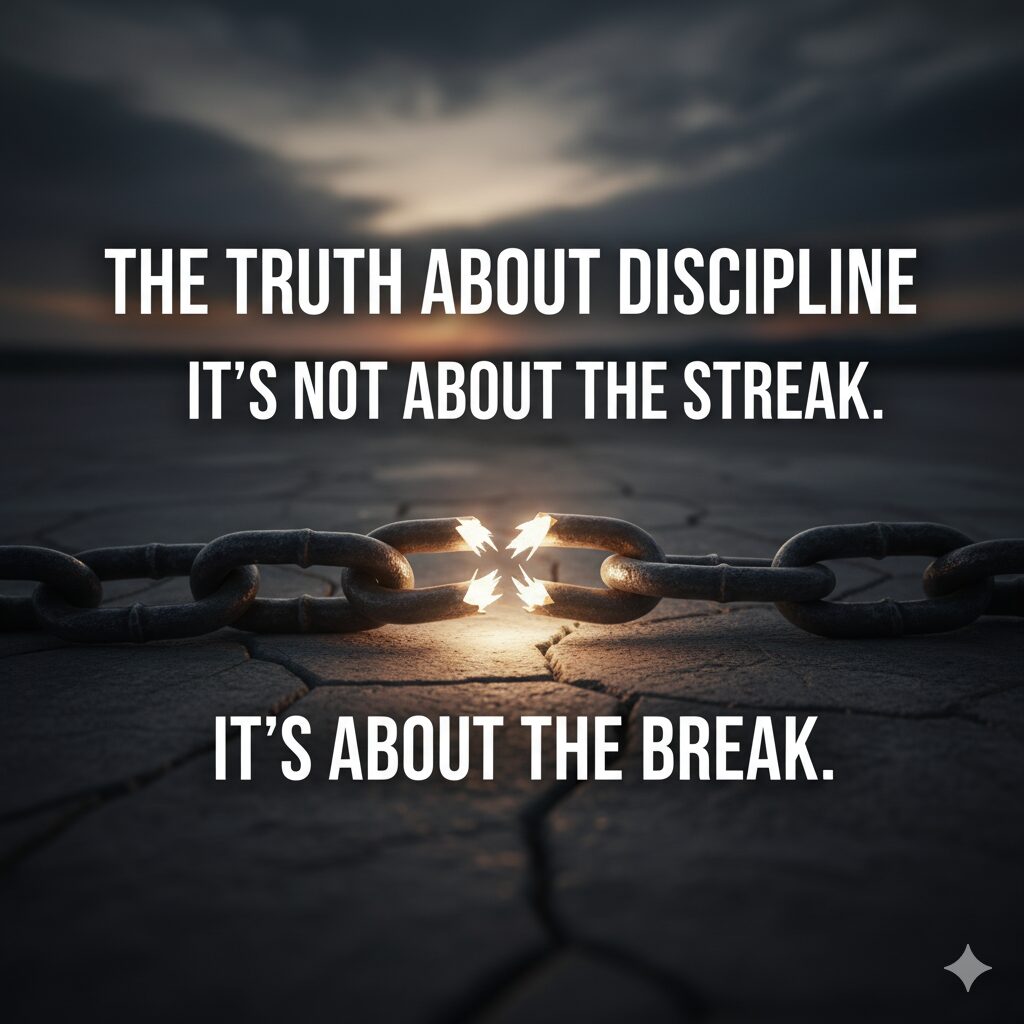Discipline Isn’t the Hard Part. Forgiveness Is.
You can drag yourself through 12-hour days. Track macros. Hit the gym. Study medicine. Launch a side hustle. Build content. Hit publish. Show up for people. Go to sleep tired, proud, and a little obsessed. But the one thing you still struggle with? Forgiving yourself when you break the streak.
We glorify discipline. We worship the early alarms, the untouched to-do lists, the zero-sugar, no-distraction, all-action lifestyle. We love the clean lines of structure, the sharp satisfaction of saying no to temptation, and the dopamine hit of control itself. It feels like winning. And for people like us the ambitious, the obsessed, the ones trying to claw their way out of mediocrity by sheer willpower discipline becomes a kind of religion. A moral code. A measurement of self-worth.
But what happens when you fail?
Not catastrophically. Not with fireworks or excuses. Just a crack in the wall. A skipped workout. A day of mindless eating. A study session that never happened. A week where your output fell off and your goals started collecting dust. Not because you’re lazy. Not because you stopped caring. But because you’re human and humans bend under pressure, even if they don’t break.
And that’s when the real war begins. Not against distraction. Not against time. But against yourself.
The Illusion of Strength

Everyone claps for discipline. The productivity reels. The perfect planners. The 5 AM cold showers. It looks like strength from the outside.
But real strength? It isn’t just about showing up when everything’s aligned and motivation is high. Strength is what happens after you fall. When the rhythm is broken, the streak is gone, and the voice in your head starts whispering that maybe you’re not built for this.
Because when your entire identity is built around being consistent, any inconsistency doesn’t feel like a small slip it feels like betrayal. Like you lied to yourself. Like the whole thing was a performance, and now the mask is cracking.
That’s the part nobody warns you about. The moment you miss a beat, it’s not just disappointment you feel. It’s panic. Self-doubt. Shame. And in those moments, most people don’t just pause. They punish. They spiral. They burn the system to the ground and start over again. Or worse, they quit altogether.
Guilt Is Not a Strategy
When your system is fueled by shame, you end up chasing perfection instead of progress. I’ve written about that trap before perfection is the great enemy of good.
The cycle is familiar. You mess up. You feel guilt. You swear to double down. You punish yourself with longer hours, stricter rules, fewer breaks. You burn out. Then you mess up again. And somewhere along the way, you start calling that self-discipline.
But it’s not.
That’s emotional blackmail. A version of productivity powered by shame instead of purpose. It masquerades as motivation, but it’s actually self-harm. And the worst part? It works temporarily. You’ll get results. Until you don’t. Until the very system that once made you powerful starts making you hate the thing you used to love.
I’ve been there. I’ve had those days where I missed one block of study and suddenly I’m trying to “make up for it” by stuffing five tasks into two hours. Not because it was smart. But because guilt was louder than logic. Because if I didn’t overcompensate, I’d start questioning everything: Am I disciplined? Am I weak? Am I falling off? You’re not broken. You’re probably just tired and maybe what you need isn’t another sprint, but a different kind of recovery.
It’s not a strategy. It’s a self-destructive loop. And you don’t escape it by working harder. You escape it by forgiving yourself faster. And if this hit close, I’ve broken down the exact burnout loop most med students fall into and how to break out of it right here.
The Strongest Thing I Do Now Is Forgive Myself
Here’s the truth: I don’t rely on motivation anymore. I’ve built systems that keep me on track. Systems that remind me what matters and automate the boring stuff. I don’t need pep talks to stay disciplined.
What I need and what I’m still mastering is how to forgive myself without spiraling. How to recover without self-sabotage. How to say, “That was a bad moment” without turning it into “I’m a failure.”
Not everything deserves a dramatic plot twist. Not every skipped gym session needs a narrative arc. Sometimes the most powerful thing you can do is treat a mistake like what it is: just a moment. A blip. Not a breakdown.
Forgiveness, in this context, isn’t soft. It isn’t weakness. It’s the reset button that keeps you consistent in the long run. It’s the thing that gets you back on track in minutes instead of months. It’s the reason you get to keep playing the game instead of rage-quitting every time you lose a life.
And that might be the greatest flex of all.
Because anyone can grind when things are going well. But the ones who rise? They’re the ones who know how to fall without breaking. The ones who know how to stumble, forgive, and still move forward.
Forgiveness isn’t the end of discipline. It’s what makes it sustainable.

